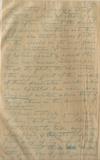Mahatma Letter to Mohini - LMW 1 No. 52
| Quick Facts | |
|---|---|
| People involved | |
| Written by: | Koot Hoomi |
| Received by: | Mohini Mohun Chatterji |
| Sent via: | unknown |
| Dates | |
| Written on: | unknown |
| Received on: | June-July 1884 |
| Other dates: | unknown |
| Places | |
| Sent from: | unknown |
| Received at: | London |
| Via: | unknown |
This letter is Letter No. 52 in Letters from the Masters of the Wisdom, First Series. Mahatma Koot Hoomi gives Mohini Mohun Chatterji permission to quote the teachings of K.H. without being concerned that it might be plagiarism. It is the final letter to Mohini.[1] In all editions before the First Series was resequenced in 1988, this was called Letter 39.
< Prev letter in LMW 1
Next letter in LMW 1 >
Page 1 transcription, image, and notes
|
To Mohini: You may, if you choose so, or find necessity for it, use in ‘Man’ or in any other book you may chance to be collaborating for, anything I may have said in relation to our secret doctrines in any of my letters to Messrs Hume or Sinnett. Those portions that were private have never been allowed by them to be copied by anyone; and those which are so copied have by the very fact become theosophical property. Besides, copies of my letters – at any rate those that contained my teachings – have always been sent by my order to Damodar and Upasika, and some of the portions even used in The Theosophist. You are at liberty to even copy them verbatim and without quotation marks – I will not call it |
NOTES:
|
Page 2
|
‘plagiarism’, my boy. From the right point of view, if you will know, it is only the expression of another person’s original ideas, some independent sentence, a thought, which in its brief completeness is capable of being constructed into a wise motto or maxim that could be constituted into what is regarded as plagiarism – the pilfering of another person’s ‘brain property’. There is not a book but is the shadow of some other book, the concrete image, very often, of the astral body of it in some other work upon the same or approximate subject. I agree entirely with Dr Cromwell when he says that ‘true talent will become original in the |
NOTES:
|
Page 3
|
very act of engaging itself with the ideas of other’; nay will often convert the dross of previous authors into the golden ore that shines forth to the world as its own peculiar creation. ‘From a series of extravagant and weak Italian romances, Shakespeare took the plots, the characters, and the major part of the incidents of those dramatic works which have exalted his name, as an original writer, above that of every other in the annals of literature.’ Thus not only you, a chela of mine, but anyone else is at liberty to take anything, whole pages, if thought proper, from any of my ‘copied’ letters and convert their ‘dross’ into pure ore of gold, provided they |
NOTES: |
Page 4
|
have well grasped the thought. Show this to L.C.H. who was already told the same.
|
NOTES: |
Context and background
Mr. Jinarajadasa provided these notes about this letter:
Transcribed from the original at Adyar.
Dr Cromwell from whom the Master quotes is probably Thomas Kitson Cromwell, Ph.D., whose name appears in the English Dictionary of National Biography. He died in 1870. He was a contributor to The Gentleman’s Magazine and Chambers Journal, as well as an author of some biographical works.[2]
Physical description of letter
According to Mr. Jinarajadasa, the original of this letter is preserved at the Theosophical Society, Adyar, Chennai, India.
Publication history
This letter was published in 1919 as Letter 39 in the first edition of Letters from the Masters of the Wisdom, 1881-1888, later known as the First Series.[3]
Commentary about this letter
Additional resources
Notes
- ↑ C. Jinarajadasa, Letters from the Masters of the Wisdom, First Series (Adyar, Chennai, India: Theosophical Publishing House, 2011), 112-113, 167-168.
- ↑ C. Jinarajadasa, 167-168.
- ↑ Letters from the Masters of the Wisdom, 1881-1888. Adyar, Madras, India; London: Theosophical Publishing House, 1919. Foreword by Annie Besant; transcribed and compiled by C. Jinarajadasa.



